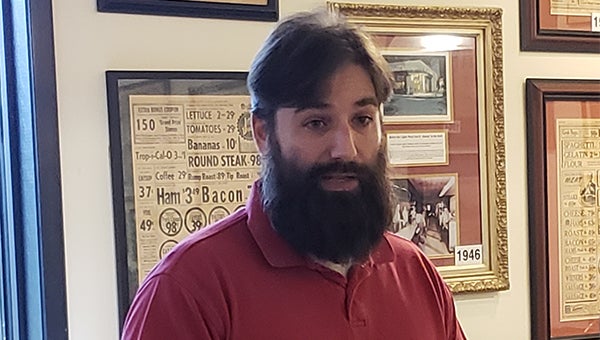Lifting Lives on its fifth year providing for families here
Published 6:58 pm Saturday, April 28, 2018

- IN ITS FIFTH YEAR: Joel Dimmette, director of Lifting Lives Ministry, discusses the mission’s work to members of the Port City Kiwanis Club.
The goal of Lifting Lives Ministry goes beyond providing a place for homeless families to stay, director Joel Dimmette said.
“When families come to us, we serve them not only with shelter,” he told Port City Kiwanians Thursday. “People don’t always need housing, they need housing-plus.
“They need a program, they need client services, so we provide clothing, food resources … we believe in independence; so families are provided services for work training, counseling, education opportunities. We recently partnered with Families First, which is doing a great job, and there are roughly 60 organizations doing a great job (with the ministry).
“We’re not a place for you to come and lay your head. What we want to see is that family be independent on their own with their own place, kids in school. Families that are working.”
Within the first 30 days of being at the shelter, he said, at least one member of the family has to be working at a job, unless they are disabled, and the families contribute to their keep.
Established in 2013, Dimmette said Lifting Lives is one of four family shelters in Mississippi.
“We have successfully served more than 1,000 families since 2013,” he said. “This is our fifth year of service and we have learned so much. It’s amazing. When I say successfully served, these are families who have left the shelter because they were able to learn something.”
Homeless families, he said, need to be empowered to be independent and participants in the community.
Dimmette said one of the hardest things he has to do is remind people in the area that there are homeless families in Vicksburg and Warren County and throughout the nation and in Mississippi.
“Mississippi has one of the highest per capita child homeless rates in the U.S.,” he said, adding that a lot of children come to the shelter ranging in age from infants to teens. “We just had a baby at the shelter,” he said.
“We see teens, but a good number of children that come to us are in that prime age between 3 and 9 years old when they are being impacted by what they see, and the reality of children with homeless families are sick and hungry four times as often as families that are not, and 83 percent of children who are suffering homelessness will experience violence.
“Violence against them, violence in their life by the age of 12. Violence will mess you up a little bit and hinder development.”
Homeless families suffer depression, educational difficulties, developmental difficulties and generational problems, he said.
“They need a big brother, a family they never had, they need parents, they need a mentor and a life skills rehab. That’s kind of we focus on,” Dimmette said.
“We help couples with school kids; we help couples with nowhere else to go. We help single fathers with children that have nowhere else to go. We help single mothers with multi-gender children.
“We focus on spiritual guidance because we believe, whatever their belief is, if they will stop and think about more than themselves, for just a while, they will probably see the errors of some of their ways.”
He said the ministry focuses on prayer and Bible study from a Christian perspective, adding the Bible study is voluntary, but chapel service two hours a week on Wednesday and Sunday is required. Families are taught literacy, life skills and financial management to help get back to independence.
“We are very unique,” Dimmette said. “Sometimes, it’s not so much what we do, but how we do it, and the criteria we have for a family to turn around. We have a specific mindset where we have hands-on guidance for self-sufficiency. That’s what we’re interested in — seeing families to go out on their own.”
He said Lifting Lives relies solely on donations from individuals, churches and businesses and the income from the warehouse store operated by the mission.
“We have used, good condition clothing and furniture; we get some people mad at us because we won’t take their trash. We try to spread in the community that poverty does not equal worthlessness. We ask for things that are in good condition,” Dimmette said.
“Poor people and poverty means needing some guidance and education, needing some motivation to self-worth. They want to walk in a store that looks nice; just the prices are cheap. They want something that smells nice. We have a affordable prices for at-risk families, and many testimonials from grandmothers taking care of their grandchildren an without that existence, they couldn’t do what they needed to do.”
The ministry also has a food pantry that is unique, because it specializes in “mobility food” that can be cooked in a microwave; things, Dimmette said that can be cooked on the go.
“We’re focused on solutions, not Band-aid problems,” he said. “We’re focused on education and stopping generational problems.”






